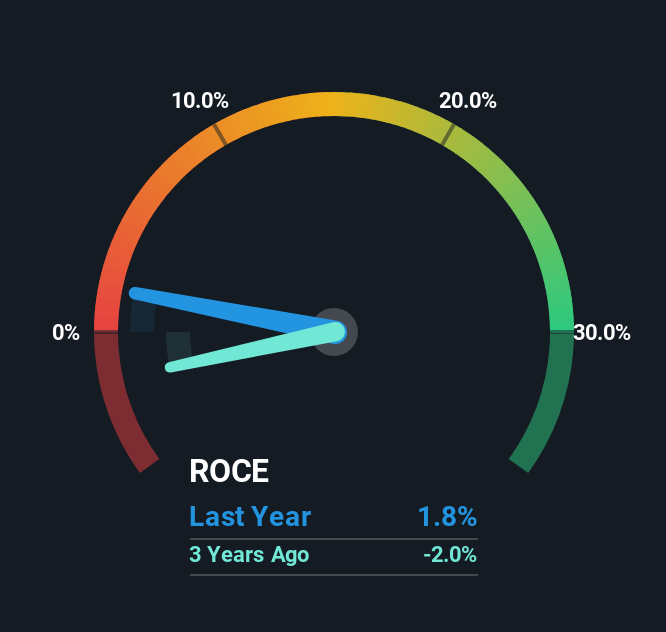When we're researching a company, it's sometimes hard to find the warning signs, but there are some financial metrics that can help spot trouble early. Typically, we'll see the trend of both return on capital employed (ROCE) declining and this usually coincides with a decreasing amount of capital employed. Ultimately this means that the company is earning less per dollar invested and on top of that, it's shrinking its base of capital employed. In light of that, from a first glance at Marcus (NYSE:MCS), we've spotted some signs that it could be struggling, so let's investigate.
What Is Return On Capital Employed (ROCE)?
For those who don't know, ROCE is a measure of a company's yearly pre-tax profit (its return), relative to the capital employed in the business. To calculate this metric for Marcus, this is the formula:
Return on Capital Employed = Earnings Before Interest and Tax (EBIT) ÷ (Total Assets - Current Liabilities)
0.018 = US$16m ÷ (US$1.0b - US$143m) (Based on the trailing twelve months to March 2025).
Thus, Marcus has an ROCE of 1.8%. In absolute terms, that's a low return and it also under-performs the Entertainment industry average of 10%.
View our latest analysis for Marcus

In the above chart we have measured Marcus' prior ROCE against its prior performance, but the future is arguably more important. If you'd like to see what analysts are forecasting going forward, you should check out our free analyst report for Marcus .
So How Is Marcus' ROCE Trending?
The trend of returns that Marcus is generating are raising some concerns. To be more specific, today's ROCE was 3.5% five years ago but has since fallen to 1.8%. What's equally concerning is that the amount of capital deployed in the business has shrunk by 33% over that same period. When you see both ROCE and capital employed diminishing, it can often be a sign of a mature and shrinking business that might be in structural decline. If these underlying trends continue, we wouldn't be too optimistic going forward.
In Conclusion...
In summary, it's unfortunate that Marcus is shrinking its capital base and also generating lower returns. Despite the concerning underlying trends, the stock has actually gained 29% over the last five years, so it might be that the investors are expecting the trends to reverse. Either way, we aren't huge fans of the current trends and so with that we think you might find better investments elsewhere.
If you'd like to know about the risks facing Marcus, we've discovered 2 warning signs that you should be aware of.
While Marcus may not currently earn the highest returns, we've compiled a list of companies that currently earn more than 25% return on equity. Check out this free list here.
New: Manage All Your Stock Portfolios in One Place
We've created the ultimate portfolio companion for stock investors, and it's free.
• Connect an unlimited number of Portfolios and see your total in one currency
• Be alerted to new Warning Signs or Risks via email or mobile
• Track the Fair Value of your stocks
Have feedback on this article? Concerned about the content? Get in touch with us directly. Alternatively, email editorial-team (at) simplywallst.com.
This article by Simply Wall St is general in nature. We provide commentary based on historical data and analyst forecasts only using an unbiased methodology and our articles are not intended to be financial advice. It does not constitute a recommendation to buy or sell any stock, and does not take account of your objectives, or your financial situation. We aim to bring you long-term focused analysis driven by fundamental data. Note that our analysis may not factor in the latest price-sensitive company announcements or qualitative material. Simply Wall St has no position in any stocks mentioned.
About NYSE:MCS
Marcus
Owns and operates movie theatres, and hotels and resorts in the United States.
Moderate growth potential with mediocre balance sheet.
Similar Companies
Market Insights
Community Narratives



